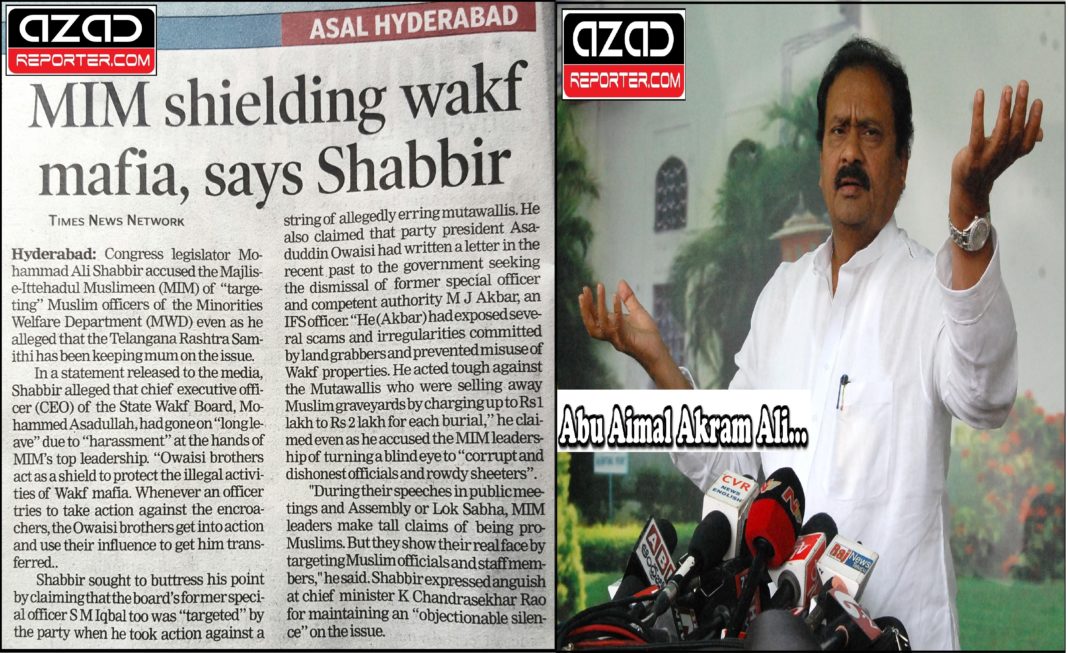Bhatkal (26 December 2016): I live in Uttara Kannada district of Karnataka, a state on the west coast of India. The district is home to nearly 600 acres of Waqf property but 50 per cent of the property has been encroached upon. This is a sample prevalent in majority of districts of India where rampant encroachment and misuse and usurpation of waqf assets, Islamic religious endowments, is a stark reality.
The amount of waqf properties in India is unimaginable as former Rajya Sabha chairman, K. Rahman Khan, who once headed a joint parliamentary committee then said, “the third largest ownership of land after the Indian Railways and the defence department is that of the Waqk”. According to an estimate, there are over 0.5 million waqf properties in India, the largest in any country in the world.
K. Rahman Khan’s detailed report outlined that almost 70 per cent of Waqf property has been encroached upon and of the remaining, cases of blatant corruption abound. Land is disposed off to real estate developers, roadside markets, hotels, malls, garages, or industries at shockingly low rents.
Taking Delhi as a case, some of the well-known cases of Delhi waqf lands occupation include CGO Complex (new central government secretariat), Jawaharlal Nehru Stadium, Oberoi Hotel, Delhi Public School on Mathura Road, Anglo-Arabic School, newspaper offices on Bahadur Shah Zafar Marg, IGI airport and umpteen other central government offices. Over ten acres of Delhi’s 34-acre Millennium Park, inaugurated by LK Advani in 2002, are Waqf lands belonging to a graveyard. The Union Cabinet’s decision in 2014 to “return” 123 Delhi waqf properties, occupied by various Central and Delhi governments departments, has been hailed as a good gesture though it is yet to be implemented.
Another case in point is West Bengal which contains 184,000 waqf properties amounting to 31 percent of all waqf properties in India.
If such is the grim situation, a complete overhauling of the system is the need of the hour. Says Zafarul Islam Khan, former president of the All India Muslim Majlis-e Mushawarat, one of the key Muslim organisations of India, “Waqf situation is as bad as ever. Since the state and central governments are the biggest enchroachers (some 60-70 percent waqf properties are under the illegal occupation of various departments of these government) there is no big hope. Even the 123 properties out of over 900 such properties which were identified and promised to be returned to the waqf board by Indira Gandhi way back in 1976, are still in government hands. The other big offender is the Muslim community itself. Mutawallis (caretakers) of waqf properties misuse, lease and illegally sell these properties. The third largest offender are state waqf boards which also misuse, lease and sell properties illegally or surreptitiously either for illegal monetary consideration or by order of some bigwig in the government.”
There are an estimated 800,000 registered waqf properties in India which include 600,000 acres of land, the largest in the world. The Central Waqf Council, a statutory body, was established in December, 1964 by the Government of India for the purpose of advising to the Central Government, the state governments and state waqf boards on matters concerning the working of the state waqf boards and due administration of the waqf properties.
The Central Waqf Council also monitors the implementation of the Waqf (Amendment) Act 2013 in States and UTs and render legal advice on protection and retrieval of the waqf properties and for removal of encroachment etc. Other functions include implementation of the Scheme for Development of urban waqf properties (both major/minor projects); identification of potential waqf land for development by the National Waqf Development Corporation Ltd.; running educational and women welfare schemes such as establishment/strengthening of ITI/VTCs, support to libraries and matching grant to the state waqf boards for the welfare of the community; overseeing the scheme of computerization of the state waqf boards records, funded by Ministry of Minority Affairs. It is also involved in the implementation of the scheme of the strengthening of the state waqf boards funded by the Ministry of Minority Affairs; obtaining necessary information from the state governments/boards on the performance of the state waqf boards; take up the waqf matters with various departments of central and state governments such as Archeological Survey of India, Railways, Revenue and Forest departments. It also interacts with the state waqf boards to ascertain the status of the implementation of the various provisions of the Act; undertakes awareness programmes to promote the interest of the Council and to sensitize waqf institutions about their role and functions.
Presently the Central Waqf Council is providing financial assistance for the following programmes:
• Matching grant to the state waqf boards for providing scholarships in their respective states to school and madrasa students and to students doing technical/professional diploma courses.
• Grant for the establishment of technical education institutes (it is) in the Muslim-concentrated areas.
• Financial assistance to voluntary organizations for vocational training.
Besides the central waqf council, there are state waqf boards in majority of the Indian states whose objective is the general superintendence of all waqfs in the state. It is the duty of the boards to exercise their power so as to ensure that the waqfs under their superintendence are properly maintained, controlled and administered and the income thereof is duly spent on objects and for the purposes for which such waqfs were created or intended.
Many believe that the Waqf (Amendment) Act, 2013 now in place, would address the grievances of the Muslim community related to waqf issues. Commenting on the Act, an editorial in the highly respected English daily, The Hindu (2013), states: The new Act recognises the failure to maintain even a basic record of the assets in many states as a principal malady, and seeks to address it within a proper time-frame. Under the amended provisions, encroachment on waqf property has been made a cognisable and non-bailable offence that could attract up to two years’ rigorous imprisonment. The Act puts the onus on state governments to ensure that waqf boards are set up and function effectively. Steps to ensure better accountability on the part of the boards have been incorporated. A statutory obligation to ensure the flow of information from state waqf boards and state governments to the Central Waqf Council has been incorporated. Stricter provisions have been provided in the amended law to reclaim property parcels alienated over the years. The new composition of the Central Waqf Council, including four persons with national eminence, to advise Central and state governments and state waqf boards, is a prudent one. So is the creation of a Board of Adjudication.”
Many others believe that the new amendments in the Act has done little in offering solutions to many questions the Muslim community has raised. Says Zafarul-Islam Khan, “The Waqf (Amendment) Bill 2013 was only half remedy. On its own wisdom the then UPA government decided to take up later the second half (executive part, which was to include Public Premises (eviction of unauthorised persons) Act (1971) where the encroacher can be jailed — at present encroachers could only be evicted without any punishment). Hence even the current Waqf law is useless since it cannot be executed and implemented without the second half. Both state and central governments are also lethargic in setting up the required waqf tribunals which would look into waqf disputes. Where such tribunals exist, they are overburdened with cases and need more judges.”
So, with Waqf properties worth trillions of rupees in every state which could well be spent on the education, healthcare, housing, etc of poor Muslims, an overhauling of the Waqf board is required. Even the Sachar Committee Report of 2006 had suggested so.
To break the den of corruption and tools for misappropriation of waqf properties an effective mechanism needs to be evolved. On the lines of civil services which selects officers, there should be an Indian Waqf Service that should select the officers to work as CEOs of waqf boards. Ensuring transparency in the administration of waqf assets should be the priority. A complete survey of all Waqf properties should be done.
Zafarul-Islam Khan offers a solution: “The best way will be to establish a Waqf Parbhandhak Committee on the lines of the official Gurudwara Parbhandhak Committee which looks after the Sikh properties in India. The current Indian Government will not so generous as to accept this proposal which will empower the Muslim community. Hence second best will be for the Muslim community to set up monitory committees at central and state levels to monitor the workings of the waqf boards.”
[This post was authored by Aftab Kola and was originally published at The MilleGazatte. Republished here with permission. Featured photo is copyrighted by Azad Reporter.]









